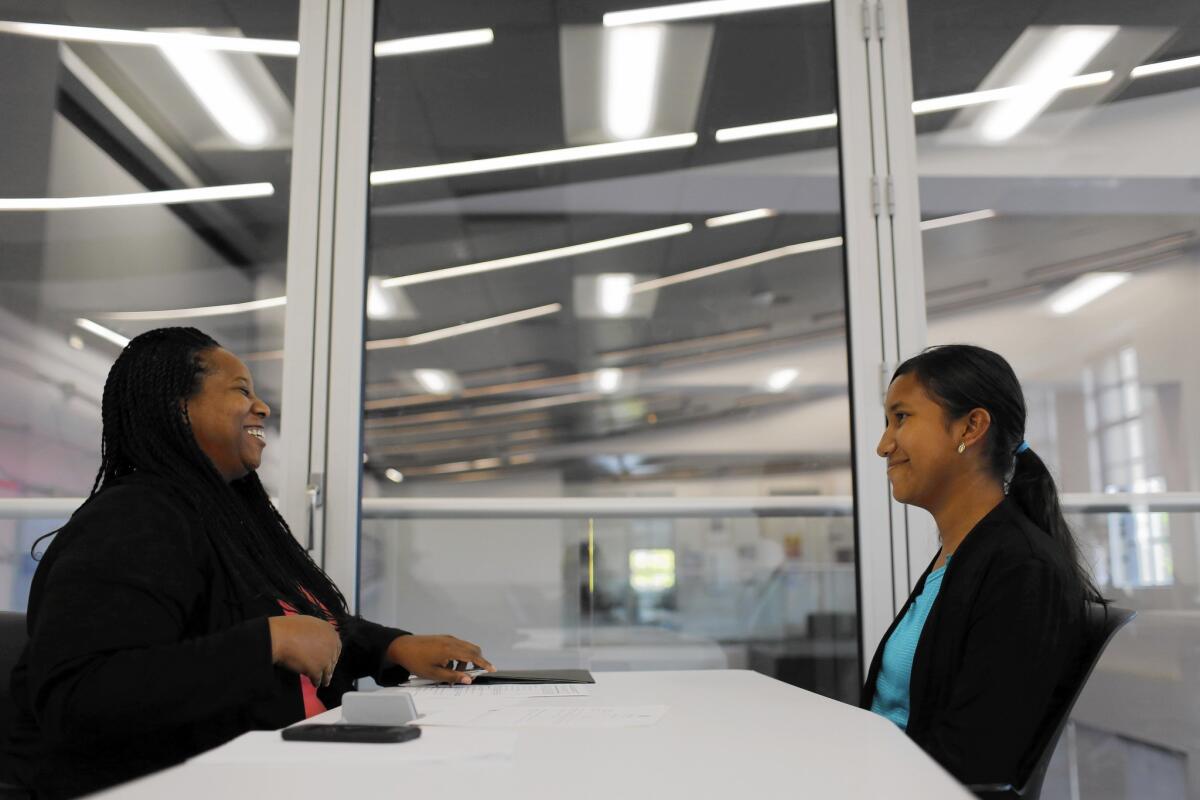Prep schools came to Southern California last weekend to recruit more minorities

A Better Chance held a fair Sunday at Occidental College to help students navigate the prep school process. Above, Ashley Alvarez, 13, right, participates in a mock interview with alumna Leslie Poston.
- Share via
Ashley Alvarez is being modest when she says, “I get mostly straight A’s.”
The eighth-grader at KIPP Scholar Academy in South Los Angeles has been the top student in her class every year since fifth grade. The only blemish on her transcript is a B+.
“It was 89.8,” she says.
Next year, Ashley, 13, hopes to start high school at one of the most selective boarding schools in the nation.
On Sunday, she was one of dozens of well-dressed Southern California middle-schoolers attending a fair at Occidental College to hone their interviewing skills and meet representatives from college preparatory schools across the nation. The event is put on each fall by A Better Chance, a nonprofit that helps students of color apply to private boarding schools, day schools and top-ranked public schools across the country.
As recruiters stand behind tables covered with banners, pennants and glossy brochures, Ashley makes a beeline for the displays of Phillips Exeter Academy in New Hampshire, the Thacher School in Ojai and a few others she has been eyeing.
She quizzes the schools’ representatives about student-to-teacher ratios, financial aid and how they would support her college plans. She shakes their hands and writes down information on a card.
Ashley is the type of talent these schools are looking for: bright and motivated with exceptional grades and high ambitions (Hers: Go to an Ivy League college. Study political science, then law. One day, become a judge).
Accompanying Ashley were her father, an auto mechanic, and her older sister, a student at Cal State Northridge. They support her plans but don’t know how the family will pay for boarding school — which can cost more than $45,000 a year — without a lot of financial aid. The program does not include a scholarship.
“It’s a constant worry,” said Ashley’s 20-year-old sister, Jessica Trujillo. “What if she gets accepted and we can’t afford it?”
Students submit transcripts, essays and letters of recommendation to A Better Chance, which prescreens the candidates and helps match them with elite schools. Participants in the competitive program are generally among the top students at their middle schools. Most are black and Latino, and many are from low-income and single-parent families.
For part of the day, each student is paired with a volunteer for a mock high-school admissions interview.
Leslie Poston, a 1996 alumna of A Better Chance, sits across a table from Ashley and asks her a rapid series of questions: What are her academic strengths? How would she feel about being one of the only students of color at a boarding school? Are her parents supportive?
Her strongest subject is English, Ashley says. She wants to attend boarding school for the academic rigor “and the risk of being alone and independent.” She is up to the challenge because “I’m a self-motivated person. I have drive.” Her mother is nervous about her going away, “but she says I’m her little bird and it’s time for me to spread my wings.”
After about 30 minutes, Poston evaluates Ashley’s performance on a rubric sheet, marking points for verbal expression, preparation, dress and other criteria on a 5-point scale.
She got all 5s, Poston tells her. “A perfect score.”
Twitter: @tonybarboza
ALSO
Families are choosing this L.A. school over privates and charters
Who might head L.A. Unified, and what are officials looking for in a leader?
Obama proposes capping standardized testing at 2% of classroom time
More to Read
Sign up for Essential California
The most important California stories and recommendations in your inbox every morning.
You may occasionally receive promotional content from the Los Angeles Times.










